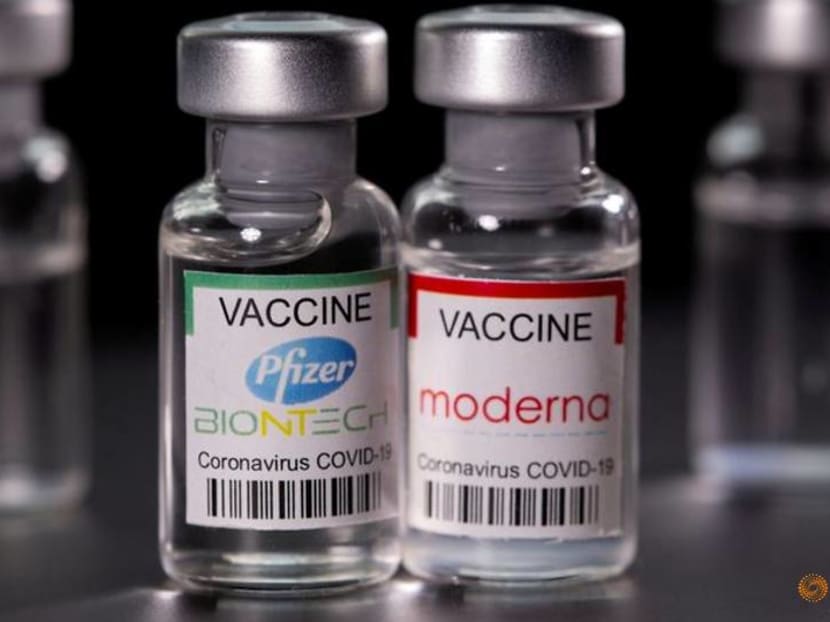Benefits of mRNA COVID-19 vaccines 'continue to outweigh' risks: Singapore expert committee

FILE PHOTO: Vials with Pfizer-BioNTech and Moderna coronavirus disease (COVID-19) vaccine labels are seen in this illustration picture taken March 19, 2021. REUTERS/Dado Ruvic/Illustration/File Photo
SINGAPORE: The benefits of receiving the mRNA COVID-19 vaccine "continue to outweigh" the risks of vaccination, said Singapore’s expert committee on COVID-19 vaccination on Monday (Jun 28) in response to an open letter attributed to a group of doctors.
The Government-appointed committee earlier this month highlighted the possibility that the second dose of the mRNA vaccines may be associated with a small risk of myocarditis and pericarditis in young men.
Myocarditis and pericarditis are inflammatory conditions that affect the heart muscles and the outer lining of the heart respectively.
Singapore uses Pfizer-BioNTech and Moderna vaccines for its national vaccination programme, which are both mRNA-based vaccines.
"The assessment is that the benefits of receiving the mRNA COVID-19 vaccines continue to outweigh the risks of vaccination,” said the committee, adding that the data on myocarditis and pericarditis has not changed.
The committee’s comments were in response to an open letter that was posted on social media, attributed to five doctors, including a cardiologist, calling for a halt in COVID-19 vaccinations for Singapore’s youths. The group cited reports of the US Centres for Disease Control and Prevention’s (CDC) investigations into the death of a 13-year-old boy after being vaccinated with the second dose of an mRNA vaccine.
The doctors also claimed that the boy died from heart failure, and highlighted recent international reports of the association between myocarditis and the second dose of the mRNA vaccines in young men.
In an updated statement on Monday afternoon, the committee said the news report cited by the doctors "did not state death from heart failure as alleged". The matter is still under investigation by the US authorities, the committee said.
"The writers also chose to highlight only one of the presentations to the Advisory Committee on Immunization Practices (ACIP) of the CDC, but failed to mention the point stated in its summary slide that 'available data indicate that patients generally recover from symptoms and do well'."
The doctors also did not mention that subsequent discussions at the same ACIP meeting went on to support the vaccination of adolescents because the benefits outweighed the risks, the expert committee said.
READ: 'Very small risk' of heart inflammation after second dose of mRNA COVID-19 vaccine: Singapore expert committee
Citing a meta-analysis of 129 studies from 31 countries involving 10,251 children, the committee said 22.9 per cent of children diagnosed with COVID-19 were admitted to the intensive care unit, and 3.6 per cent died.
In the US alone, of the around 4 million children infected with COVID-19 since the beginning of the pandemic, about 380 between the age of 12 and 17 have died. COVID-19 in young people can also result in multisystem inflammatory syndrome and other prolonged disability, the committee said.
"In the face of a more transmissible Delta variant associated with more severe COVID-19, it is imperative that we protect our children from severe COVID-19 and its complications," it said.
This means full vaccination of two doses of a COVID-19 vaccine, as studies showed that one dose confers 33 per cent protection against the Delta variant.
"In fact, Israel has recently started vaccinating teenagers after the Delta variant caused school outbreaks as well, despite earlier news reports stating a more ambivalent position," the committee said.
READ: US FDA adds warning about rare heart inflammation to Pfizer-BioNTech, Moderna COVID-19 vaccines
The data reported from the US indicates that cases of myocarditis following mRNA vaccinations are rare, with almost all such cases resolved.
Medical associations in the US, such as the American College of Paediatrics and the American Heart Association, have continued to encourage vaccination in everyone aged 12 years and older, the committee said.
"Nevertheless, we understand the anxiety parents face, and hence we endorse MOH’s position to make vaccination voluntary in Singapore, even as it is strongly encouraged."
The expert committee reiterated an earlier recommendation that those vaccinated, particularly adolescents and younger men, avoid strenuous physical activity for one week after their second dose. They should also seek medical attention promptly if they develop chest pain, shortness of breath or abnormal heartbeats.
The committee said it will continue to monitor the data and review its recommendations as needed.
The Big Read: Conspiracy theories, scientific misinterpretations, plain ignorance abound in COVID-19 infodemic
The committee’s comments on Monday followed a similar statement made last month in response to an open letter by 12 doctors that called for children to be given non-mRNA COVID-19 vaccines over fears of “unknown and unstudied” long-term side effects.
Eleven of the 12 doctors later retracted their statements.
Earlier this month, messages on social media claimed that inactivated virus COVID-19 vaccines - such as China’s Sinovac - were more effective against COVID-19 variants than mRNA-based vaccines, prompting the committee to dispute that claim.
BOOKMARK THIS: Our comprehensive coverage of the coronavirus outbreak and its developments
Download our app or subscribe to our Telegram channel for the latest updates on the coronavirus outbreak: https://cna.asia/telegram





